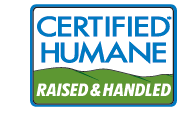
Should you spend more money to buy Certified Humane Raised and Handled meat?
You may have noticed more meat and poultry products in the grocery stores sporting the “Certified Humane Raised and Handled” logo. While a few products state on the label that they are cage free or raised without antibiotics, it’s hard to know to what extent those claims are true without and sort of respected certification.
The blue, green and white logo of the Certified Humane program, run by the non-profit group Humane Farm Animal Care, has been around since 2003. The organization has established standards on how animals raised for dairy, lamb, poultry and beef products are handled throughout their lives, with a goal to ensuring animals that are raised for food are comfortable and cared for “from stable to table.” The thinking is that, since 95 percent of people eat meat, there is value in working with farmers, ranchers and producers to ensure the animals that are raised for food are treated in a humane manner during their lives.
Few people stop and think about how the meat, dairy and eggs on their plates were raised. When you begin to understand the basic standards for the humane treatment of the animals providing this food you realise how most non-certified meat is raised.
-
The Certified Humane label guarantees that the meat or dairy product “Meets the Humane Farm Animal Care Program standards, which include nutritious diet without antibiotics, animals raised with shelter, resting areas, and sufficient space and the ability to engage in natural behaviours.”
-
The certification also means that beef cannot be fed growth hormones, antibiotics can be used to treat sick animals and producers must comply with environmental standards.
-
Certification means that chickens aren’t caged, have perches, room to move around and spread their wings. Laying hens have nest boxes and they don’t have their beaks removed. Industry standards allow cages that are too small for hens to stand properly, turn around, or spread their wings. Industry standards are similar for pigs, in that they can be caged in crates that don’t allow sufficient space to turn around.
There are human health and environmental impacts to standard factory farm practices as well.
Cramped quarters in factory farms means diseases are rampant so livestock is fed a steady diet of low dose antibiotics, contributing to drug resistance in people too. (50% of antibiotics used in Canada are fed to livestock.) The mass production of meat accounts for about 18% of greenhouse gas emissions worldwide. Manure runoff from factory farms is also a source of pollution
Visiting local farmers markets and meeting the farmer who raises your meat and eggs is one way to know if your food is raised humanely and sustainably. Since that isn’t possible or practical for many people, relying on an established and respected certification program is the next best way to ensure that the food on your table has been well raised.
Locally look for Blue Goose poultry, DuBreton pork products and Aspen Ridge Natural Beef.







Thanks Bridget this is worth sharing.